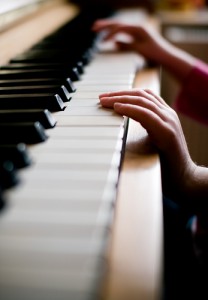By: Aaron Zimmerman
 Thinking back to your school days, which teachers do you remember? Chances are they weren’t your favorites because of their academic accolades. It’s unlikely that you remember the teacher because they were brilliant orators or subject matter experts. You remember them because, somehow, they reached you. They inspired you, they made you excited about what you were learning. If a teacher cannot inspire, nothing else will matter. Finding such a piano teacher is no small task. But don’t overlook this most critical aspect of teaching. Always schedule a trial lesson, encourage the teacher talk to your child, watch them interact. If a teacher is a bad fit, you’ll know.
Thinking back to your school days, which teachers do you remember? Chances are they weren’t your favorites because of their academic accolades. It’s unlikely that you remember the teacher because they were brilliant orators or subject matter experts. You remember them because, somehow, they reached you. They inspired you, they made you excited about what you were learning. If a teacher cannot inspire, nothing else will matter. Finding such a piano teacher is no small task. But don’t overlook this most critical aspect of teaching. Always schedule a trial lesson, encourage the teacher talk to your child, watch them interact. If a teacher is a bad fit, you’ll know.
Treat your search for a music teacher just like a job interview. Don’t be afraid to ask a lot of questions. Ask for a resume and check references. Reach out to several candidates so you have options to compare and measure against. A good teacher can make a tremendous difference in your child’s musical education.
Below are some questions to use as a starting point when interviewing prospective piano teachers.
Teaching Style – What are you strengths as a teacher?
There is no global right answer here. But there is probably a right answer for you. Consider what you want from music lessons and find a teacher that can provide that.
-
Foundational Theory
If you want your child to transfer to a different instrument in a few years, find a teacher that knows music theory, and worry less about someone with advanced piano technique. Find a teacher that is fun and laid back to introduce your child to a fun, low-pressure musical learning experience.
-
Music Appreciation
If your goal is for your child to develop a general appreciation for music, seek out a teacher that knows music history who is familiar with different styles of music (including rock and jazz as well as classical, baroque).
-
Concert Pianist
If you want your child to become a concert pianist, or at least have the option, avoid teachers who specialize in beginner students. Look for teachers that are solid performers themselves. Inquire at a local conservatory for a recommendation. -
Composition
If you’d like to hone your child’s composition skills, consider a teacher with composition experience. Bonus points if they know how to play multiple instruments.
Lesson Mechanics – What method book do you use?
There is no one size fits all lesson plan. Every student has unique strengths, weaknesses, or goals, so give the teacher a chance to discuss that. If a teacher were to say, “I always use XXXX”, that would be a red flag for me. A teacher should get to know the child and consider his or her unique needs when selecting a method book. If the teacher were to pick a older method that hasn’t been updated, such as “John Schaum”, or “John Thompson”, that would also be a red flag, as these methods are quite antiquated in their pedagogic approach. My personal favorite method is The Music Tree http://www.methodbooks.com/store/musictree/. Even if I don’t use it for a particular student, I find myself often supplementing with books from the music tree series. It is carefully researched with a natural, child-oriented sequence. Some other good methods are Piano Town and Hal Leonard.
Business Stuff – What is your cancellation policy, How much do you charge per lesson?
Don’t forget that this is a business. There’s no reason to avoid discussion of payments and policies. Hopefully the teacher can provide you with a written document of studio policies outlining payment in clear terms. Take the time to read and understand this before enrolling your child. Don’t be afraid to ask questions if it’s unclear. It will be easier to discuss business aspects ahead of time than after you have been taking lessons for a month and discover you had misread something.
What questions does the teacher ask?
Do they blindly accept any student or do they ask questions about what your goals are for your child? Here are some examples of questions good teachers often ask:
-
Why do you want to take piano lessons?
A teacher’s main duty is to discover a student’s goal and help them get there. If the teacher doesn’t ask why you’re enrolling your child, why they want to learn, that is a huge red flag. -
How much practice time do you expect to have? If the teacher asks about your child’s level of commitment in some way or another, it might indicate that they are looking for quality students, not just paychecks.
-
Above all a teacher should show an interest in your child. They should engage your child, to lay the foundations of a relationship, not just set them down in front of the piano and say “play this”. The specific questions don’t really matter here, the intent should come through. Listen for things like:
-
What kinds of music do you like? Do your parents or relatives play an instrument? What grade are you in? What are your hobbies?
-
Picking a teacher should be fun, many great teachers have different niches, different techniques. Spending a little time finding the right one will be well worth it in the end.
Aaron Zimmerman is a passionate musician who brings a unique approach to music education. Aaron earned a Master’s degree in Music Composition from The University Of Missouri at Kansas City while studying piano with Jane Solose and Michael Pagan and composition with Chen Yi.
Image credit: Flickr/obstinato
